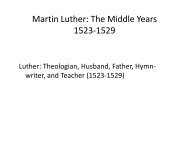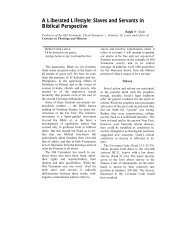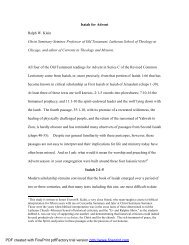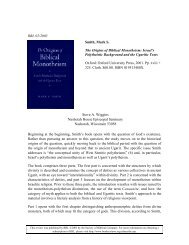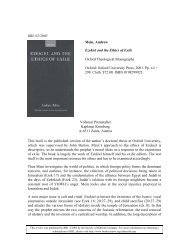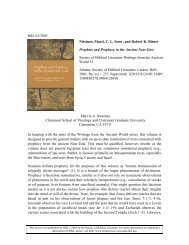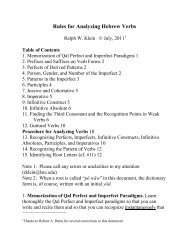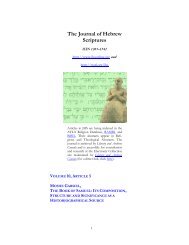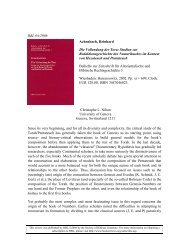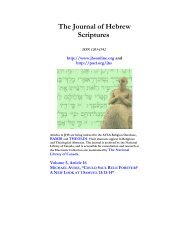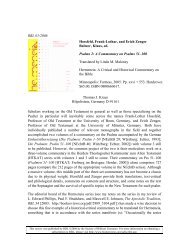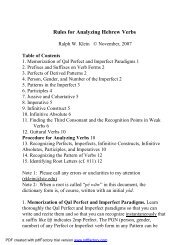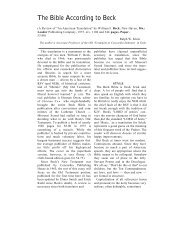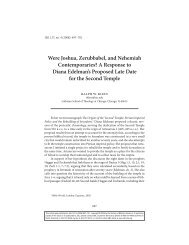“GO, I BEG YOU, TAKE YOUR BELOVED SON AND SLAY HIM ...
“GO, I BEG YOU, TAKE YOUR BELOVED SON AND SLAY HIM ...
“GO, I BEG YOU, TAKE YOUR BELOVED SON AND SLAY HIM ...
You also want an ePaper? Increase the reach of your titles
YUMPU automatically turns print PDFs into web optimized ePapers that Google loves.
4 isaac kalimi<br />
the Aqedah) and “You shall not murder” (Exod. 20:13 // Deut. 5:17;<br />
appears as subsequent to the Aqedah)? 8<br />
Furthermore, the Aqedah is the only episode among the biblical stories<br />
of Abraham that opens with the words: “God did test Abraham”<br />
(Gen. 22:1). 9 This opening indeed softens readers’ criticism regarding<br />
God’s cruelty, 10 on the theory that God in fact did not request a<br />
human sacrifice but only a demonstration of Abraham’s unconditional<br />
belief. To be sure, the end of the story proves its original intention<br />
(Gen. 22:11–12). The rabbis followed the biblical text and consider<br />
the whole story a test. God tests Abraham’s absolute faithfulness: is he<br />
ready to give his most precious, beloved son to God?<br />
But why should God test Abraham at all? If He knows the test’s<br />
result, why does He test him? If He does not know the result (an idea<br />
that emerges from the words at the end of the story, “for now I know<br />
that you fear God . . .;” Gen. 22:12b), then the story puts in question<br />
God’s completeness. The harmonistic interpretation of the Rabbinic<br />
sources (e.g., Genesis Rabbah 56:7; ca. 400–500 C.E.) 11 and their<br />
medieval followers 12 does not make the problem disappear. The view<br />
that God himself knew the result but that He just wanted to show<br />
Abraham’s righteousness to people is unacceptable because no one was<br />
on the mount at the time of the Aqedah (unless we say that God knew<br />
that this story would be told to following generations). Moreover, as<br />
the Jewish German philosopher Hans Blumenberg states: “What the<br />
philosophers cannot accept from God is the obedience He demands<br />
from Abraham—obedience that stands against all the nature—to offer<br />
8 In 1798 Immanuel Kant cited Genesis 22 as an example in which God could not<br />
have really commanded Abraham to slaughter Isaac, because it would have violated<br />
the moral law; see Westermann, Genesis 12–36: A Commentary, vol. 2, p. 354.<br />
9 On the “test/trial” in general, see J. Licht, Testing in the Hebrew Scriptures and in<br />
Post-Biblical Judaism ( Jerusalem, 1973; Hebrew).<br />
10 Similarly, the story in Job 1–2 provides the background that God only tests Job<br />
in order to reveal his loyalty to God in bad as well as in good times.<br />
11 This article quotes from a wide variety of Rabbinic (and other) sources. It is not<br />
always easy to establish their exact dating. I note the relative or accepted dates of the<br />
sources in order to furnish some sense of chronological sequence and development.<br />
Regarding the Midrashim, I usually follow M.D. Herr, “Midrash,” in Encyclopedia<br />
Judaica ( Jerusalem, 1971), cols. 1511–1512. Nonetheless, it is important to keep in<br />
mind that the late editing of a work does not necessarily exclude the possibility of its<br />
containing much earlier material.<br />
12 See, for example, Saadia Gaon and Abraham ibn Ezra in their commentaries on<br />
the site; and Maimonides, Guide of the Perplexed 3:24.



